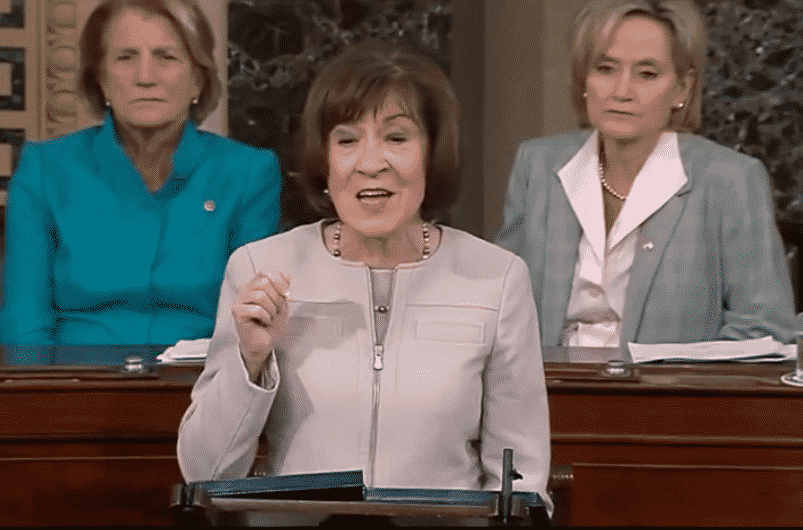“I think it’s pretty obvious from the vote today that it is extraordinary unlikely that the president will be convicted… Just do the math.”
That was Sen. Susan Collins’ (R-Maine) statement to the New York Times after a Senate vote with 45 Senate Republicans including Senate Minority Leader Mitch McConnell (R-Ky.) moving to dismiss the impeachment trial of former President Donald Trump on the point of order that it was unconstitutional to convict and “remove” a president who is no longer in office.
The point of order was originally raised by Sen. Rand Paul (R-Ky.). Senate Majority Leader Chuck Schumer (D-N.Y.) moved to table the point of order, prompting the Senate voting 55 to 45 to table the motion.
Sen. Collins was one of five Republicans to vote against the Paul motion, which also included Sens. Mitt Romney (R-Utah), Lisa Murkowski (R-Alaska), Ben Sasse (R-Neb.) and Pat Toomey (R-Pa.).
In arguing for the point of order, Sen. Paul stated, “we’re basically wasting our time” with the impeachment trial now that Trump’s out of office.
Sen. Paul explained, “I think there will be enough support on it to show there’s no chance they can impeach the president. If 34 people support my resolution that this is an unconstitutional proceeding, it shows they don’t have the votes.”
And after the vote, Sen. Collins agreed, citing the vote as making it “extraordinarily unlikely” for the Senate to obtain a conviction.
Of which, there is little wonder. Almost 9 out of 10 Republican voters oppose convicting former President Trump in recent polling by Reuters-Ipsos.
Plus, it is not even constitutional to hold a trial for “removal” after President Trump’s term has already expired. Article II, Section 4 of the Constitution states “The President… shall be removed from Office on Impeachment for, and Conviction of, Treason, Bribery, or other high Crimes and Misdemeanors.”
And Article I, Section 3 states “Judgment in Cases of Impeachment shall not extend further than to removal from Office, and disqualification to hold and enjoy any Office of honor, Trust or Profit under the United States…”
Those constitutional provisions are all inclusive and must be read consistently. Only a sitting president can be removed and since conviction must include removal, there cannot be an impeachment trial of a former president.
Moreover, on the merits of the charge, “incitement of insurrection” for the speech Trump gave on Jan. 6 at the Save America Rally, Trump explicitly urged those protesting the certification of the election results by Congress to “peacefully and patriotically make your voices heard.” That is protected speech under the First Amendment and cannot be made into a crime by Congress.
In addition, evidence is emerging that planning for the riot at the Capitol that followed the speech began days and weeks prior to the rally and was done on social media outlets like Facebook, according to Justice Department court filings. If the riot and attacking Capitol Police was premeditated and pre-planned, then it was not a spontaneous outcome of Trump’s speech.
Finally, one has to ask what interest President Joe Biden has in wasting valuable Senate floor time in his first 100 days with his own party prosecuting his former opponent from the 2020 election in a trial that has practically a zero percent chance of conviction.
Biden just spent his Inaugural Address saying, “To restore the soul and secure the future of America, requires so much more than words. It requires the most elusive of all things in a democracy: unity… We can see each other not as adversaries but as neighbors.”
Now, with the divisive impeachment trial upon us beginning Feb. 8, risking further stoking the partisan divide, Biden’s call for national unity has gone unheeded in less than a week, with a trial almost certain to fail. As Sen. Collins urged, just do the math, Mr. President.
Robert Romano is the Vice President of Public Policy at Americans for Limited Government.








